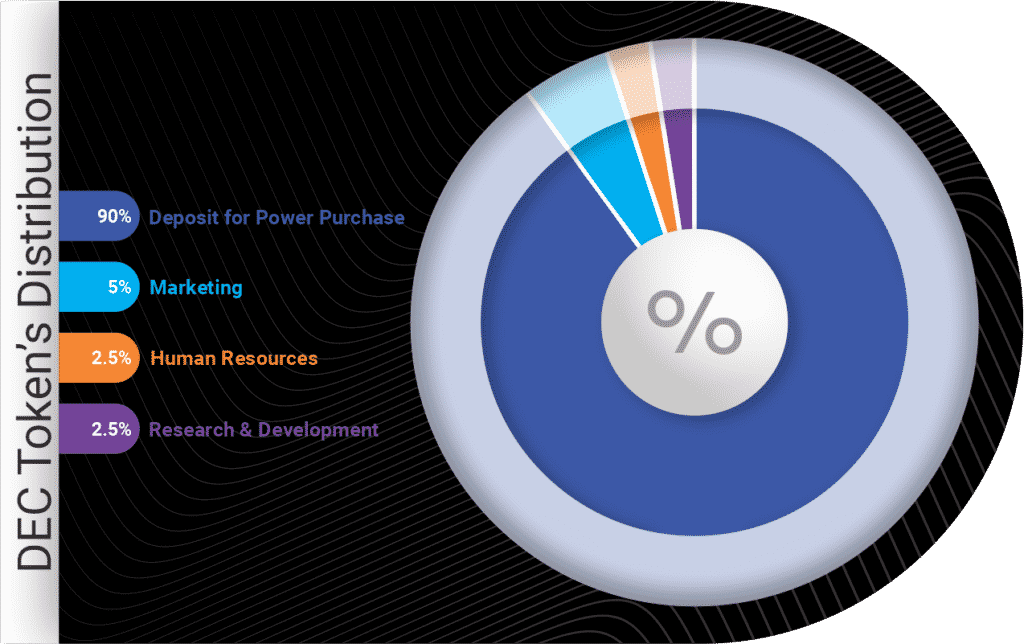
DEC token is in the spotlight. What about PM token?
Digital Energy Currency or DEC is the energy currency created specifically for the blockchain economy. This token is funding the development of low-cost sustainable energy, aiming to power the blockchain data centers. The team launched its private sale on February 1, 2022. After it ends, the company will start the public ICO sale. Currently, the price of 1 DEC is 0.035 USD, but it will increase after the initial coin offering ends. DEC token is very high ranked on various ICO listing platforms, and its popularity will likely increase in the future. The total supply of tokens is 1,500,000,000.
Members of the PermianChain Miner platform will be able to access power sites that are hosting crypto mining data centers. Miners and DEC token holders will also be able to earn sustainable power in the form of DEC. They can then utilize this power as energy credit, thus keeping their mining equipment running on power sites that are registered on the PermianChain blockchain platform.
What does DEC offer?
According to the team, the crypto miners that need the energy will easily use DEC tokens. It will be simple to implement the tokens for the natural gas companies that have the energy to offer. Furthermore, DEC will enable users to create energy from natural gas that would otherwise have been wasted. This token provides two key benefits to the current situation.
First of all, it stops crypto activities competing with existing businesses and individuals for power, thus, taking away the pressure on national grids. By removing the risk of blackouts, users will reduce the risk of a government clampdown. And secondly, this token will reduce the impact that both the crypto and the oil and gas sectors have on the environment.
By improving the way that crypto uses energy, users will enhance perceptions of the sector and potentially attract more liquidity. Eventually, they will be able to put an end to the rolling disaster that may soon smother the crypto economy’s numerous potential enhancements if left unchecked.

What about the PM token?
Like DEC, PM is one of the most trending tokens. Its ICO began on February 28, 2022. The sale will end on March 14, 2022. The token price is 0.005 USD per PM, and the company accepts ETH, LTC, BCH, ERC20, BNB, USDT, and USDT in exchange for its native tokens.
Peermoon is a Defi mobile wallet. Defi users can invest, manage, and track finance conveniently in one app. Through the Peermoon app, customers will be able to invest in different asset classes, like cryptocurrencies, ETFs, stocks, loans, real estate, commodities, etc.
Furthermore, through the Peermoon app, users will be able to perform other financial transactions. This app will allow them to track the performance and the statistics of the investment portfolio in one place. Such benefits make the Peermoon app a unique investing tool in the market.
How is this product secured?
Peermoon wallet uses extensive obfuscation and encryption, along with pre-damage and metadata removal to defend itself from attackers. Moreover, the app uses methods including check-summing, debugger detection, resource verification, jailbreak/root detection method, and swizzling/hook detection to identify whether an attack is being attempted at run-time. The app responds to cyber-attacks by shutting down itself, self-repairing, and informing the user.
According to the team, for Defi to be successful, the gateways for interacting with web 3 must be secure, intuitive, and accessible. It should also maintain the core ethos of being its own bank.
Over the past few years, Defi users have seen drastic improvements to wallets and other asset management tools. Thus, most of the time, investors and users can safely and easily access the next generation of financial technology.
Most DeFi wallets are key-based. Underneath the hood, these wallets have a unique key pair. They are different from centralized wallets because users are responsible for the safekeeping of their private keys, often introduced through a 12-word seed phrase. Customers can also send and transfer funds knowing they are the only one who has access to those funds.
Besides, virtually all non-custodial wallets can handle a suite of assets. Ethereum-specific Defi wallets allow users to deposit ETH in tandem with stablecoins like Dai, ERC721 tokens like Axies, and ERC20 tokens like KNC. Users can access virtually all DeFi wallets by connecting a web3 wallet. Mobile wallets have also begun to integrate dApps browsers to make it easy to connect with Defi applications without ever having to leave the app.
The Peermoon Wallet offers all these features and more
With the Peermoon Wallet, customers will access a wide range of decentralized innovations. They will be able to buy and store Bitcoin, Ether, ERC-20 tokens, as well as other crypto-assets, collect rare digital collectibles, and access emerging web3 applications.
Furthermore, Peermoon Wallet will support an expansive list of digital assets. In the first phase, it will allow users to store, send, and receive the following assets: Bitcoin (BTC), Bitcoin Cash (BCH), Ripple (XRP), Ether (ETH), Litecoin (LTC), Ether Classic (ETC), Stellar Lumens (XLM), Ethereum-based ERC-721 tokens, an Ethereum-based ERC-20 tokens.
With DeFi wallets, users don’t need to complete KYC or provide any background information. Even though there are mostly no fiat onramps when using Defi wallets, they are still flexible thanks to integration across a wide variety of apps in the Defi ecosystem.
Besides, Defi is debatably the safest option on the market nowadays. The catch is that users are entirely in control of their own destiny. If they lose their seed phrase, there is no customer support to be able to “reset” their password in many cases.
Furthermore, Defi wallets have no deposit limits. Some wallets like Argent have daily limits, but there are mostly no restrictions to the amount of capital that can flow in and out of a Defi wallet on any given day. And most Defi wallets are Ethereum-native, meaning they support ERC20 tokens, Ether, and ERC721 tokens. This also includes protocol-specific tokens on lending platforms. Defi wallets can also hold more specialized assets such as Set Protocol Sets and Synthetix Synths. The Peermoon wallet offers all these advantages to its users.
-
Support
-
Platform
-
Spread
-
Trading Instrument




